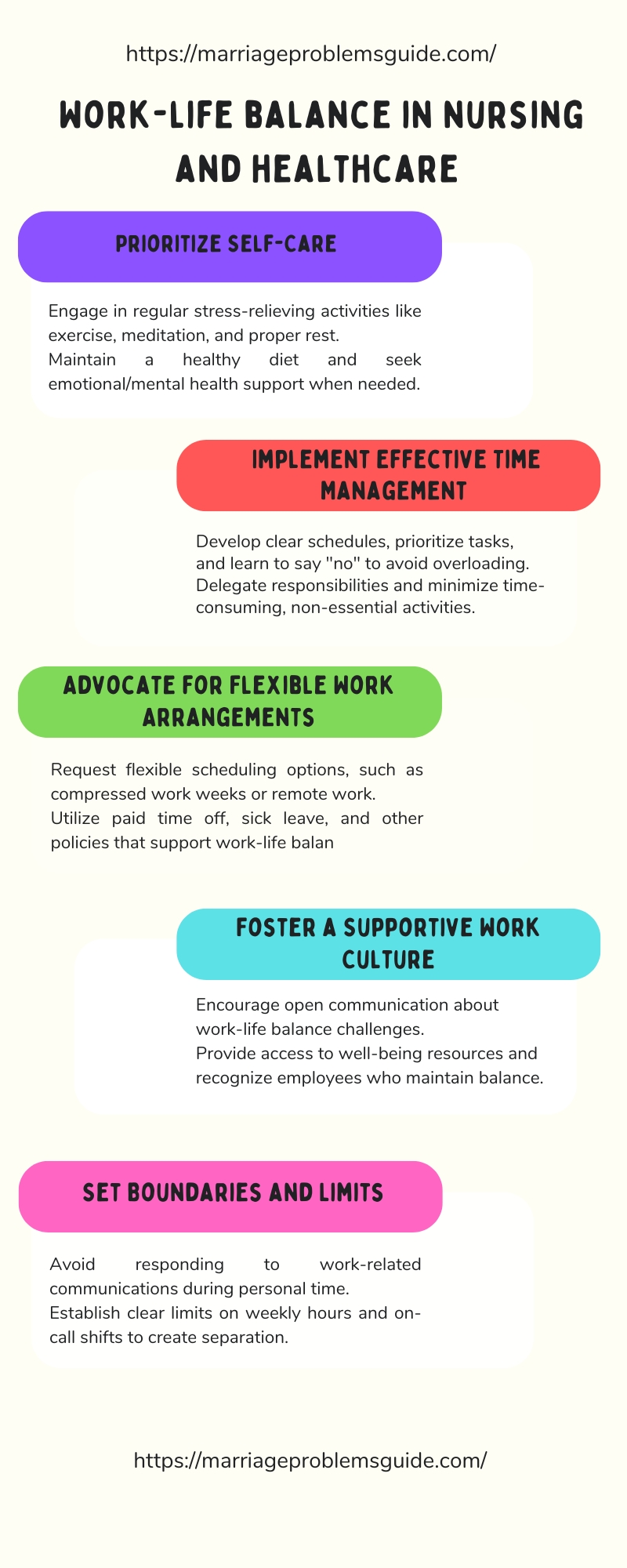The healthcare industry is widely recognized for its demanding nature, with nurses and other medical professionals often faced with long hours, high-stress situations, and a seemingly endless workload.
This intense work environment can take a significant toll on the personal lives and well-being of these critical caregivers, leading to issues such as burnout, job dissatisfaction, and poor work-life balance.
Maintaining a healthy work-life balance is crucial for nurses and healthcare workers, not only for their own personal fulfillment but also for the quality of care they can provide to their patients.
In this blog post, we will explore the importance of work-life balance in the nursing and healthcare professions, identify the key challenges, and discuss practical strategies for achieving a more harmonious integration of professional and personal responsibilities.
The Importance of Work-Life Balance in Nursing and Healthcare
1. Preventing Burnout and Promoting Wellbeing
Burnout is a common issue among nurses and healthcare professionals, characterized by emotional exhaustion, depersonalization, and a reduced sense of personal accomplishment.

When work-life balance is not adequately maintained, the risk of burnout increases significantly. Burnout can lead to a range of negative outcomes, including decreased job satisfaction, increased absenteeism, and even higher rates of clinical errors.
By prioritizing work-life balance, nurses and healthcare workers can mitigate the risk of burnout and maintain their overall well-being. This, in turn, can improve the quality of patient care, enhance job satisfaction, and foster a more positive work environment.
2. Improving Patient Outcomes
The well-being of healthcare professionals directly impacts the quality of care they can provide to their patients. When nurses and other medical staff are experiencing high levels of stress, fatigue, or burnout, their ability to make critical decisions, communicate effectively, and provide empathetic care can be compromised.
Conversely, healthcare professionals who maintain a healthy work-life balance are more likely to be engaged, attentive, and better equipped to address the needs of their patients. This can lead to improved patient outcomes, higher levels of patient satisfaction, and a more positive healthcare experience for all involved.
3. Enhancing Recruitment and Retention
Work-life balance has become an increasingly important factor for healthcare professionals when considering their career options.
Nurses and other medical staff who feel supported in their efforts to maintain a healthy balance between their professional and personal lives are more likely to be satisfied with their jobs and less likely to seek employment elsewhere.
By prioritizing work-life balance initiatives, healthcare organizations can enhance their ability to attract and retain top talent, ultimately strengthening the overall quality and stability of their workforce.
Challenges to Work-Life Balance in Nursing and Healthcare
1. Demanding Work Schedules
One of the most significant challenges to work-life balance in the nursing and healthcare professions is the demanding nature of work schedules. Nurses and other medical staff often work long shifts, rotating schedules, and extended hours, leaving little time for personal and family activities.
The physical and emotional toll of these demanding schedules can lead to fatigue, stress, and a sense of imbalance, making it difficult for healthcare professionals to maintain a healthy work-life integration.
2. High-Stress Environments
The healthcare industry is inherently high-stress, with nurses and other medical staff regularly exposed to life-or-death situations, emotional patient interactions, and the pressure to make critical decisions quickly.
This constant exposure to stress can have a profound impact on an individual’s mental and physical well-being, making it challenging to achieve a healthy work-life balance.
3. Lack of Support and Resources
In many healthcare organizations, there may be a lack of formal support systems and resources available to help nurses and other staff members navigate the challenges of work-life balance.
This can include limited access to counseling services, inadequate childcare or eldercare support, and a lack of flexible scheduling options.
Without the necessary support and resources, healthcare professionals may struggle to find effective ways to manage their professional and personal responsibilities, further exacerbating the work-life balance challenge.
necessary support and resources, healthcare professionals may struggle to find effective ways to manage their professional and personal responsibilities, further exacerbating the work-life balance challenge.
4. Societal and Cultural Expectations
The healthcare profession is often characterized by a culture of long hours, self-sacrifice, and the expectation of putting the needs of patients before one’s own.
This societal and cultural narrative can create a sense of guilt or shame for healthcare professionals who prioritize their personal well-being, making it difficult to advocate for their own work-life balance needs.
Strategies for Achieving Work-Life Balance in Nursing and Healthcare
1. Prioritizing Self-Care
One of the fundamental strategies for achieving work-life balance in the nursing and healthcare professions is to prioritize self-care. This may include:
- Engaging in regular exercise, meditation, or other stress-relieving activities
- Ensuring adequate sleep and rest
- Maintaining a healthy diet
- Seeking emotional and mental health support when needed

By prioritizing their own well-being, healthcare professionals can better manage the demands of their work and maintain a sense of balance in their lives.
2. Effective Time Management
Effective time management is crucial for healthcare professionals who are seeking to achieve a healthy work-life balance. This may include:
- Developing a clear schedule and prioritizing tasks
- Delegating responsibilities when possible
- Minimizing time-consuming activities or tasks that do not directly contribute to patient care or professional development
- Practicing the art of saying “no” to requests that may overload their schedules
By implementing effective time management strategies, healthcare professionals can free up more time for their personal and family responsibilities, helping to create a better sense of balance.
3. Advocating for Flexible Work Arrangements
Healthcare organizations should strive to offer flexible work arrangements that cater to the needs of their employees. This may include:
- Offering flexible scheduling options, such as compressed work weeks or the ability to work remotely
- Providing paid time off, sick leave, and other leave policies that support work-life balance
- Implementing job-sharing or part-time employment opportunities

By advocating for and utilizing these flexible work arrangements, healthcare professionals can better manage the demands of their work and personal lives.
4. Fostering a Supportive Work Culture
Creating a supportive work culture that values and promotes work-life balance is crucial for healthcare organizations. This may include:
- Encouraging open communication and dialogue about work-life balance challenges
- Providing access to counseling, mentorship, and other well-being resources
- Recognizing and celebrating the achievements of healthcare professionals who have successfully maintained a healthy work-life balance
By fostering a supportive work culture, healthcare organizations can empower their employees to prioritize their well-being and find a more harmonious integration of their professional and personal responsibilities.
5. Seeking Work-Life Balance Role Models
Identifying and learning from healthcare professionals who have successfully navigated the challenges of work-life balance can be a valuable resource for those seeking to improve their own balance. This may include:
- Connecting with experienced colleagues or mentors who can share their strategies and tips
- Attending workshops, conferences, or professional development programs that focus on work-life balance in the healthcare industry
- Engaging in peer-to-peer support groups or online communities where healthcare professionals can share their experiences and learn from one another
By seeking out and learning from work-life balance role models, healthcare professionals can gain valuable insights and practical strategies to help them achieve a more fulfilling and balanced life.
6. Maintaining Boundaries and Setting Limits
Establishing clear boundaries and setting limits on work-related activities can be a critical component of achieving work-life balance. This may include:
- Avoiding the temptation to respond to work-related emails, calls, or messages during personal time
- Setting limits on the number of hours worked per week or the number of on-call shifts taken
- Consciously disconnecting from work during personal time, such as during vacations or weekends
By maintaining these boundaries and setting clear limits, healthcare professionals can create a more defined separation between their professional and personal lives, leading to a greater sense of balance and well-being.
Conclusion
Achieving a healthy work-life balance is a crucial challenge facing nurses and other healthcare professionals in today’s demanding and high-stress industry.
By recognizing the importance of work-life balance, addressing the key challenges, and implementing practical strategies, healthcare organizations and their employees can work together to create a more supportive and sustainable work environment.
Through a combination of self-care, effective time management, flexible work arrangements, and a supportive organizational culture, healthcare professionals can strive to maintain their well-being, provide exceptional patient care, and find a more harmonious integration of their professional and personal responsibilities.






